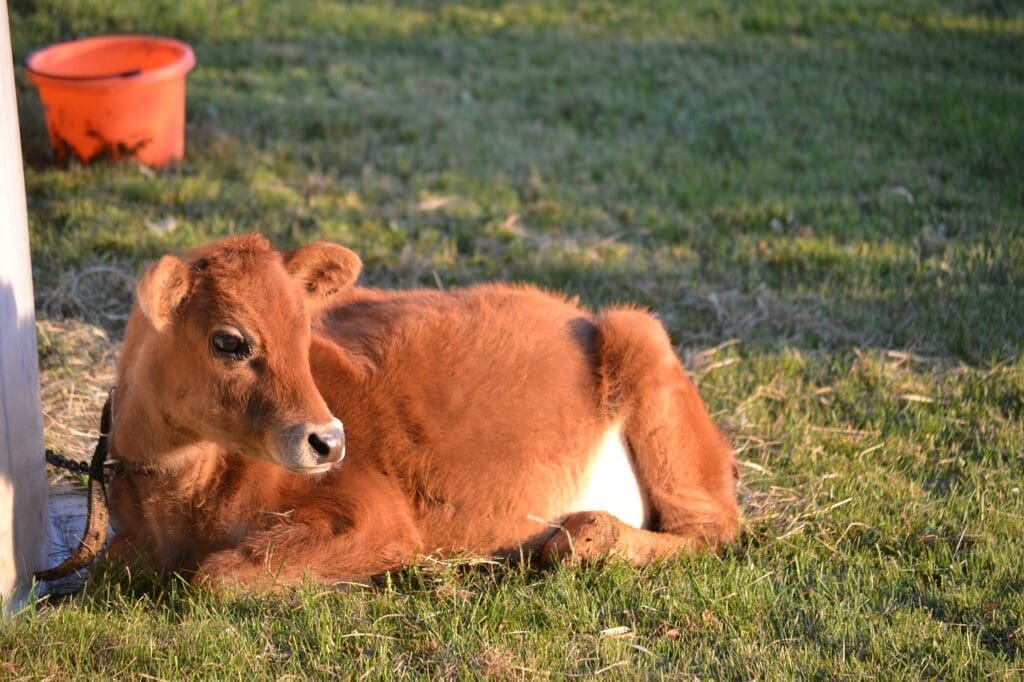Tips for Healthy Jersey Cattle in Spring
Spring is here, along with some of our best tips for healthy Jersey cattle. Spring is a busy time for Jersey milk cow homesteaders. There’s lots to do, especially if you have sows who are ready to give birth to Jersey calves. Following these guidelines can help all your Jersey cattle stay healthy through spring and well into the summer months.
Rain + Jersey Cattle = Health Hazards
Our homestead is in New Mexico, so we don’t get a lot of rain here in the spring months. If you live in an area of the country that sees a sloshy, sloppy spring, it’s important to do what you can to minimize its effects on your Jersey cattle.
Jersey calves are the most affected by excess moisture, especially in their bedding. If you keep your Jersey cattle in outside hutches, it’s essential to keep their bedding clean and dry. If your hutches sit on dirt or another similar base, you may need to change the bedding more frequently.
Moist conditions are ideal for bacteria to breed. Bacteria can cause all sorts of unpleasant health conditions for your Jersey cattle, including mastitis. Keeping bedding and other areas where cows stand or lay frequently clean and dry is your best defense against disease and illness.

Spring Clean (Your Milking Equipment)
You should be cleaning and sterilizing your milking equipment after each use. However, it’s never a bad idea to give it some extra attention.
Just like you spring clean your home, consider spring cleaning your milking equipment to ensure it’s in tip-top condition. Wash it all in warm, soapy water. Then rinse it in a hot sanitizing solution. We make our own with either a small amount of bleach or hydrogen peroxide.
Next, check all your equipment over to make sure it’s in good working order. This includes all tubing and connectors. If you use a milking machine, check with the manufacturer to inquire if there are any care requirements to keep it working efficiently.
Fortify Your Jersey Cattle Feed
Parasites can be a pesky problem for any cattle. Jersey cattle are no exception. Adding a little coccidiostat to your Jersey cattle feed can help slow the growth and reproduction of coccidian parasites. Spring weather brings with it lots of fluctuating temperatures in some parts of the country. Weather variations can be stressful for Jersey cattle, especially calves.
If your cattle get stressed enough, their immune systems can become suppressed. Bugs that Jersey cattle and their calves normally could fight off might hit them harder because of their weather-induced immunosuppression. You don’t need your veterinarian’s permission to give your Jersey cattle coccidiostat.

Special Instructions for Jersey Calves
If you plan to welcome Jersey calves to your family this spring, make sure you have the perfect environment for protecting their health. Warm, dry spaces are best suited for calving to prevent calves’ temperatures from dropping too quickly after birth. If springtime temperatures are a bit on the chilly side where you live, make sure you put your Jersey calves in a heated environment. Clean, dry straw can help them hold in their body heat.
Consider boosting their immunity with colostrum. Jersey calves should get 3 to 4 quarts of pure colostrum within two hours of their birth. Look for colostrum designed to supplement, rather than replace, natural colostrum Jersey calves get from their mothers.
Lastly, make sure your little ones get enough to eat. Like other growing babies, Jersey calves need to eat smaller meals more often. Make sure they also have plenty of fresh water.
Can Cleaning a Cast Iron Skillet Affect the Health of Jersey Cattle in Spring?
Cleaning a cast iron skillet is important to prevent rust and maintain its cooking surface. However, it is crucial to avoid using harmful chemicals that may affect the health of Jersey cattle in spring if the residue gets into their feed. Utilize natural methods like using salt and oil to clean cast iron.
Spring is for Healthy Jersey Cattle
Don’t forget to have your Jersey cattle evaluated by your veterinarian to ensure they are staying healthy. The average Jersey milk cow sees their vet up to five times a year. If it’s been a while since your cow went to the doctor, spring is the perfect time to schedule a visit.
Have other springtime tips for keeping your Jersey cattle healthy? We’d love to hear about them in the comments!
In our kitchen, we only use cultures from Cultures for Health.
Get yours here and start culturing today.
Popular Articles
Newsletter
Get signed up to get latest updates and new information from the Jersey Milk Cow!
This site uses Akismet to reduce spam. Learn how your comment data is processed.












Leave a Reply